Episodes
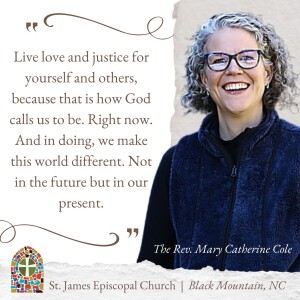
Monday Jan 30, 2023
Monday Jan 30, 2023
"Live love and justice for yourself and others, because that is how God calls us to be. Right now. And in doing, we make this world different. Not in the future but in our present."
- The Rev. Mary Catherine Cole
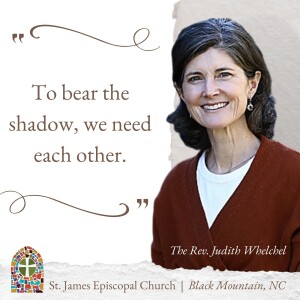
Monday Jan 23, 2023
Monday Jan 23, 2023
"To bear the shadow, we need each other."
- The Rev. Judith Whelchel
Isaiah 9:1-4
1 Corinthians 1:10-18
Matthew 4:12-23
Psalm 27:1, 5-13
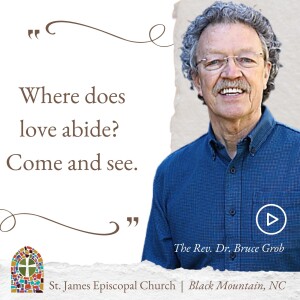
Tuesday Jan 17, 2023
Tuesday Jan 17, 2023
"Where does love abide? Come and see."
- The Rev. Dr. Bruce Grob
Isaiah 49:1-7
1 Corinthians 1:1-9
John 1:29-42
Psalm 40:1-12
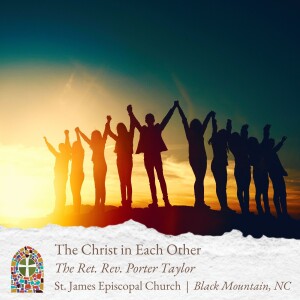
Friday Dec 23, 2022
Friday Dec 23, 2022
In her essay “Christ” in the book Amazing Grace: A Vocabulary of Faith, Kathleen Norris writes about how hard it is to believe in Jesus being both human and divine. Then she visits a convent, and the sisters invite her to join them in their Sunday evening service. This is how the essay ends:
“Our procession was also a reminder of the procession of life itself; the older sisters with their walkers and canes had set a pace that the younger women had to follow. The prioress was my partner; we brought up the rear. “We bow first to the Christ who is at the altar,” she whispered to me, as the procession lurched along, “and then we turn to face our partner, and bow to the Christ in each other” “I see,” I said, and I did.”
If we think that Christmas is merely about presents and candy, we miss the point, but if we think Christmas is merely about an event 2,000 years ago, we also miss the point. Eugene Peterson’s translation of John 1:14 helps us:
“The Word became flesh and blood and moved into the neighborhood.”
If Christmas is just a celebration of an historical event, it can’t be about transformation. Instead, it’s about God’s grace moving into our neighborhood so that we “face our partner and bow to the Christ in each other.”
And the neighborhood is deeper and wider than we are comfortable with. Yes, it’s Joe Biden, but it’s also Donald Trump. It’s all races and tribes and denominations. It’s the people whose family tree goes back to the Mayflower and people who do not have papers of citizenship. Most of all, it means God is part of this world. We just need eyes to see. We must “bow to the Christ in each other” regardless of who the other is.
This is not just for our soul’s sake; it’s for the world’s sake. Because the communion business is not a hot commodity these days.
My wish for you and for all God’s children is that the Christmas gift is not clothes or toys or even books. My wish is that all God’s children—which means everyone—experience a new birth; a new way of seeing and being so that when we see the stranger, we will bow to the Christ in him/her/they.
- The Ret. Rev. Porter Taylor

Thursday Dec 22, 2022
Thursday Dec 22, 2022
A friend in seminary taught me to needlepoint. There were lots of lectures, it was something to do with my hands.
She was famous for intricate Christmas stockings. She guided me to a simpler project – a creche. It wasn’t quite as simple as I’d hoped, and it turns out I am slow stitcher. It took three years to complete. Consequently, I valued the creche highly, as a family heirloom, and displayed it on the mantel, far from the maddening crowds of children and dogs. But one Christmas a dozen years ago the needlepoint creche was on the floor (in a plastic bag) while we decorated the tree…
My daughter caught the dog behind a chair with the Baby Jesus—he growled about giving it back. We saved what could be saved. There are eleven pieces to the creche—the dog had his choice. Somehow, he chose the main event. This is what many of us are doing in church – trying to get a hold of Jesus. In the mid-week Eucharist, we pray that we might become what we receive. The Eucharist is our yearning for God.
Here at Advent with ponder something different--the incarnation is God’s yearning for us.
On Christmas Eve, December 24, 1937 the Christ Child visited St. Faustina. She writes of her vision:
When I arrived at Midnight Mass, from the very beginning I steeped myself in deep recollection, during which time I saw the stable of Bethlehem filled with great radiance. The Mother of God, all lost in the deepest of love, was wrapping Jesus in swaddling clothes, but Saint Joseph was still asleep. Only after the Mother of God put Jesus in the manger did the light of God awaken Joseph, who also prayed. But after a while, I was left alone with the Infant Jesus who stretched out those little hands to me, and I understood that I was to take him in my arms. Jesus pressed his head against my heart and gave me to know, by his profound gaze, how good he found it to be next to my heart.
Advent readies us for the great mystery that our yearning for God is met with God’s yearning for us. What an affair of love.
- The Rev. Judith Whelchel
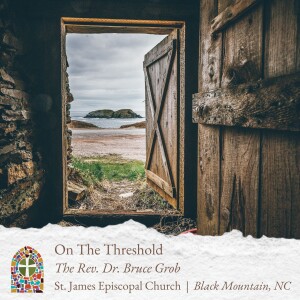
Wednesday Dec 21, 2022
Wednesday Dec 21, 2022
“In the universe, there are things that are known, and things that are unknown, and in between them, there are doors.” —William Blake
Language is steeped in metaphor. We often describe standing in front of a door as being on “the threshold”. A threshold is what you step across when you enter a room. A threshold takes you from one place into another, and when you're about to start something new, you're also on a threshold. A threshold is a point of departure or transition; something must be left behind to move into something new. Each new chapter of our lives brings endings and beginnings.
In his book “To Bless the Space Between Us”, Irish poet John O’Donohue writes:
A threshold is not a simple boundary; it is a frontier that divides two different territories, rhythms, and atmospheres. Indeed, it is a lovely testimony to the fullness and integrity of an experience or a stage of life that it intensifies toward the end into a real frontier that cannot be crossed without the heart being passionately engaged and woken up.
Genuinely engaging with the grief and the growth of our threshold moments can truly be transformational. O’Donohue invites us to take our first steps by reflecting on these five questions:
At which threshold am I now standing?
At this time in my life, what am I leaving?
Where am I about to enter?
What is preventing me from crossing my next threshold?
What gift would enable me to do it?”
Richard Rohr tells us thresholds enable us “to see beyond ourselves to the broader and more inclusive world that lies before us”.
The willingness to embrace these threshold moments allows us to choose hope over denial or despair. Our former certainty has died, but in its place are the seeds of a hope which isn’t simply wishing but formed by glimpses of possibility and purpose.
O’Donohue concludes:
“It is wise in your own life to be able to recognize and acknowledge the key thresholds: to take your time; to feel all the varieties of presence that accrue there; to listen inward with complete attention until you hear the inner voice calling you forward.
There are threshold moments in each of our lives. Moments when the past that lies behind us seems present and real. Moments when the future that lies ahead of us seems apparent and hopeful. Such special threshold moments when past and future meet in a vivid awareness of Now are rare and holy. Times such as these remind us that our time together comes to us as a precious gift.
A Blessing as we stand on this Threshold.
“What we choose changes us.
Who we love transforms us.
How we create remakes us.
Where we live reshapes us.
So in all our choosing, God, make us wise.
In all our loving, Christ, make us bold.
In all our creating, Spirit, give us courage.
In all our living, may we become whole.
And may God’s blessing be upon all of us who listen and those we love, and for those for whom we pray this day and forever more. Amen.”
- The Rev. Dr. Bruce Grob
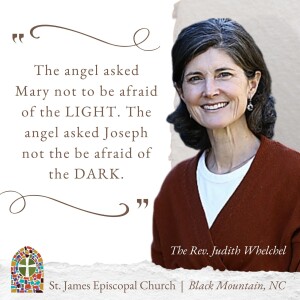
Wednesday Dec 21, 2022
Wednesday Dec 21, 2022
"The angel asked Mary not to be afraid of the LIGHT. The angel asked Joseph not the be afraid of the DARK."
- The Rev. Judith Whelchel
Isaiah 7:10-16
Romans 1:1-7
Matthew 1:18-25
Psalm 80:1-7, 16-18

Monday Dec 19, 2022
Monday Dec 19, 2022
This week we are in the home stretch of our Advent journey and Christmas is nigh. We have been invited into the stories of our faith as we have traveled through the pages of Scripture, we have been invited into the depths of our own stories as we have reflected on the season and what it stirs for us within. While we have been invited on the journey—and we may feel ready to “get there”—because, who doesn’t love singing Christmas carols, gathering with loved ones, opening and giving gifts!?, I would like to offer that while Advent ends, the path on which we have been traveling does not. One of the definitions for Advent is “a coming into being” … and I love the notion that at this beginning of our Christian calendar for the year, every year, we are reminded that we are always being invited into a coming into being as the Christ is born into the world. In Jesus’ coming, so we are invited to our birth and rebirth, our very becoming. Feminist process theologians offer us the frame of understanding God as the One who invites us always toward wholeness and goodness. This is one way we can experience God as manifested through us and in our world. The invitation toward becoming is an active process of exploration and seeking, not an arrival at a stopping point in our spiritual journey. As we continue to walk into this holiday season and into the new year, I offer this poem from Jan Richardson: How the Light Comes I cannot tell youhow the light comes.What I knowis that it is more ancientthan imagining.That it travelsacross an astounding expanseto reach us.That it lovessearching outwhat is hiddenwhat is lostwhat is forgottenor in perilor in pain.That it has a fondnessfor the bodyfor finding its waytoward fleshfor tracing the edgesof formfor shining forththrough the eye,the hand,the heart.I cannot tell youhow the light comes,but that it does.That it will.That it works its wayinto the deepest darkthat enfolds you,though it may seemlong ages in comingor arrive in a shapeyou did not foresee.And somay we this dayturn ourselves toward it.May we lift our facesto let it find us.May we bend our bodiesto follow the arc it makes.May we openand open moreand open stillto the blessed lightthat comes.
- The Rev. Mary Catherine Cole
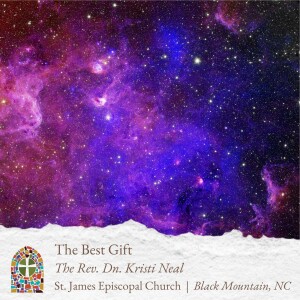
Sunday Dec 18, 2022
Sunday Dec 18, 2022
“The Empire Strikes Back”, the second of the Star War series was released in June 1980. My son was 7 years old. That year for Christmas all he wanted was a Millennium Falcon, the Han Solo spaceship. That was it. He asked for one thing and one thing only. Of course, the Millennium Falcon was the most requested Christmas gift that year. Remember, this was before computers and Cyber Monday deals. I drove all over North Carolina from Greensboro to Charlotte and every toy store from there to the far west of NC. Finally, I found one! I admit I spent too much money for it, but there was no way we were going to disappoint our sweet boy.
Many years later in 2002, my three-year-old granddaughter asked for one thing and one thing only. Though there had been no advertisements for such a thing, all she wanted was a Snoopy umbrella. This time her mother had the advantage of the internet and finally located the requested gift on eBay. The owner lived in England. After a phone call, she agreed to ship the umbrella by the quickest way possible and it did in fact arrive before Christmas. My daughter never told me how much that umbrella cost! The umbrella was a limited edition from 1964.
As human parents we do whatever we can to give our children their hearts’ desires. I have a friend who fosters fragile babies. It is a difficult, precious, and rewarding gift that she gives these babies who struggle to live. She spends many nights in hospitals and others walking a baby who is going through detox. She literally gives these babies a second chance at life. Many parents in these inflationary days are unable to give their children even the simplest gift. We help those families annually by participating in the Swannanoa Valley Christian Ministry Adopt a Stocking program.
In less than a week we will celebrate the best Christmas gift, the gift of an incarnate God in the form of a baby, born into a mean world, the son of working-class parents displaced from home by a cruel leader. It is a story of the divine becoming a breathing human on earth, experiencing all the feelings of humanity. The gospels tell us beautiful stories about his birth; stories of angels singing and a bright star and awestruck shepherds and a caravan of sages from far away bringing exotic gifts. But the stories also tell us about this child taking his first breath in a stable, probably a cave with a stone manger for his bed and the breath of animals to keep him warm. This baby and his parents spent over two years in exile as political asylum seekers in a strange land. The family was finally able to return to their hometown of Nazareth where this baby boy was nurtured in a faithful Jewish family.
In Genesis 2:7 we read, “then the LORD God formed man from the dust of the ground and breathed into his nostrils the breath of life; and the man became a living being.” When we take our first breath after leaving our mother’s body it is cause for great celebration. God breathes the breath of life into each one of us. Jesus, the incarnate God breathed the breath of life into his disciples, “When he had said this, he breathed on them and said to them, ‘Receive the Holy Spirit.” (John 20:22) This gift of breath, of being able to take air into our lungs where it passes into our blood stream and circulates throughout our bodies allowing each of our cells to function, is the ultimate gift, the best gift. It is the gift of life. No wonder so many times in the Bible God is described as giving breath.
Deep breathing can calm our anxieties, slow our heart rates, and give us peace. This last week of Advent, give thanks for your breath. Pay attention to your breathing. The quiet days of Advent are a good time to begin practicing the intentional long slow breathing that leads us into a place of meditation and an openness of heart. We can hear the divine within us.
Breathe and listenGod is here

Friday Dec 16, 2022
Friday Dec 16, 2022
Today is the feast day of Dorothy Sayers, 1893-1957. Her father was a priest in The Church of England. Dorothy received a degree from Oxford in Medieval Literature. She wrote fifteen Peter Wimsey detective novels and many other novels. She also wrote a translation of The Divine Comedy by Dante, which I can confess is a very accessible vehicle into this rich text.
As I thought about Dorothy Sayers, I remembered a quote by C. S. Lewis: “For me, reason is the natural organ of truth; but imagination is the organ of meaning. Imagination, producing new metaphors or revivifying old, is not the cause of truth, but its condition.”
As we move closer to Christmas, perhaps what we might let go of in these last weeks of Advent is our addiction to empirical facts. Instead let us embrace our imagination and our need for story. John Shea wrote, “We turn our pain into narrative so we can bear it; we turn our ecstasy into narrative so we can prolong it. We tell our stories to live.”
If we are to experience Christ being born in our lives and in this broken world, it won’t be by figuring it out through reason. Rather, it will be by connecting our individual story with the larger narrative of God being born in this world in the most unexpected ways. I remember hearing Bishop John Spong lecture in Hendersonville years ago. He spoke about what science reveals about the scripture. I thought it was interesting and engaging, but really he was answering questions I wasn’t asking. All I wanted to know is, “Is it true?” Not how science reveals it happened, but how my story is connected to the ongoing story of God being born in this world and how resurrection always follows death.
In other words, we see the world by the lens we put on. Reason is helpful, but it cannot have the final word. Again, Lewis: “imagination is the organ of meaning.”
As we draw nearer to Bethlehem, can you connect your story to Mary and Joseph, two people—strangers in a strange land—realizing the only home they have is one another? Can you embrace the story in your life and believe that the power of God is stronger than your disbelief? In the midst of such political rancor, can you believe the Prince of Peace will be born again in this country and in yourself?
Frederick Buechner wrote a book---Telling the Truth: The Gospel as Tragedy, Comedy and Fairy Tale. He writes that the Gospel is a fairy tale that is different because “it not only happened once upon a time but has kept on happening ever since and is happening still.” Yes---in Black Mountain, NC and in your life.
- The Rt. Rev. Porter Taylor
